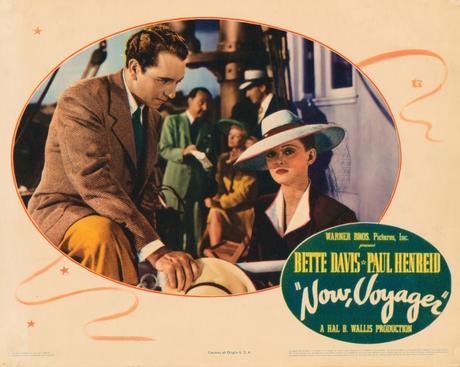
The word “iconic” gets thrown around a lot these days, but it’s a word well deserved when you’re talking about someone like Bette Davis. Over the course of her career, she delivered many legendary performances and her sensitive, vulnerable performance as Charlotte Vale in 1942’s Now, Voyager is easily among her best, with Gladys Cooper also turning in one of the all-time great villain performances as Charlotte’s overbearing mother. Now, Voyager has remained popular over the years with good reason, but before it was a successful movie, it was a novel by Olive Higgins Prouty.
Book & Movie Differences
For the most part, the film version of Now, Voyager is a pretty faithful adaptation of the book. It doesn’t follow the book right down to the letter, but most of the key events are covered, just in a more condensed way.
One of the most significant differences between the book and the movie is evident right off the bat. Rather than opening with Dr. Jaquith coming out to the Vale family home to meet with Charlotte before going off to Cascade, the book opens with Charlotte already on the cruise and the events leading up to her time at Cascade are told through flashbacks. Dr. Jaquith is frequently mentioned throughout the book, but we don’t see Charlotte directly interact with him until near the end of the book, after the death of her mother. While the first 20 minutes of the movie is largely the creation of screenwriters, it does establish some key things about Charlotte and her personal history which are covered in the book, like how she needs to hide things from her mother in her room and the romance she had with a ship employee on a past vacation which her mother actively destroyed.
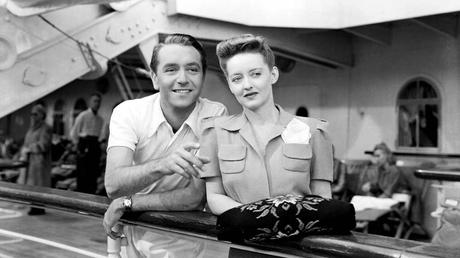
As for Jerry, the book gets into more depth about his personal life and the state of his marriage. The movie leaves out a scene where he writes a message to his wife from his cabin on the ship which details how very careful he is about choosing his words to avoid upsetting her. It’s also made clear that Jerry has never been able to provide the type of lifestyle his wife desires, which has long been a significant source of stress in his life. Jerry, like Charlotte, has nervous breakdown, but he was unable to afford to see Dr. Jaquith. The movie really doesn’t touch on Jerry’s economic situation.
The character of Lisa is more substantial in the book as well. In both versions, Lisa is, by far, Charlotte’s biggest supporter in the family. But in the book, she has a larger story arc that makes her something of an aspirational figure to Charlotte, showing her that it’s still possible for her to have the kind of life that she wants for herself. In the beginning of the book, Lisa is recently widowed and had decided to get remarried. During the cruise, Charlotte wears many of Lisa’s clothes, which Lisa lets her keep afterward so that she can start completely fresh with her new husband. After meeting Charlotte upon returning from the cruise, Lisa stays in New York to get married while Charlotte continues on home to prevent Charlotte’s mother from getting too much shocking news at once. By the end of the book, Lisa is expecting another child. While her new baby will be a later in life child much younger than its siblings, just as Charlotte was, Lisa’s baby is very wanted.
The movie mentions that Elliot Livingston is a widower, one thing that isn’t mentioned is that he had seemingly been depressed in the four years since his wife’s death. In the early stages of his relationship with Charlotte, it’s noted that his maids are excited that he’s starting to host casual events at his home again because that’s something that hadn’t been happening in the time since his wife passed away. Between these types of insights about Elliott, Lisa, and Jerry, the book version of Now, Voyager becomes a larger story about people who have experienced hardships in their life helping each other. The recently widowed Lisa helps Charlotte improve her life by getting her to Dr. Jaquith. Jerry’s interest in Charlotte is like a suit of armor that helps her embrace her new life. Charlotte inspires Jerry to make more of an effort in his marriage after the cruise. Charlotte’s relationship with Elliott helps him move on from his late wife. And, of course, Charlotte is able to help Jerry’s daughter, Tina.
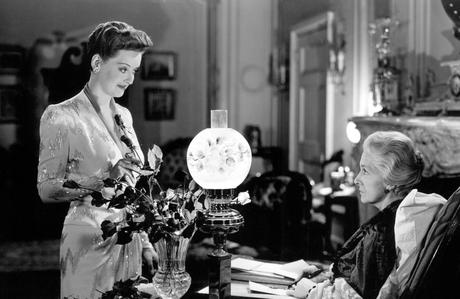
As for Charlotte, what you see in the movie is pretty much what you get in the book. You just get more insights to her feelings and personal history, such as how thrilling it is for her to make an impression on people she meets on the cruise without the influence of the Vale name. Or the fact that when she was younger, her older brothers would refuse to pick her up from activities after one of them was mistaken for her father because of the age difference. However, the movie makes some bigger diversions from the source material near the end of the movie. The movie makes it seem like Charlotte’s return to Cascade is purely a result of blaming herself for the death of her mother. But in the book, Charlotte also loses her entire support system shortly after her mother passes away and becomes very lonely. She hit a stretch of time when virtually her entire newly expanded social circle simply wasn’t around. Even many of the servants from the family home had moved on. When she goes to New York to see Dr. Jaquith, she tries to contact her friends there to no avail. As a last resort, she tries to contact Jerry and does see him at a train station, but she stays hidden when she realizes that he is with his family. She can tell that Jerry is also feeling lonely, and while she can’t speak to him, she finds some comfort in the idea that they’re essentially lonely together.
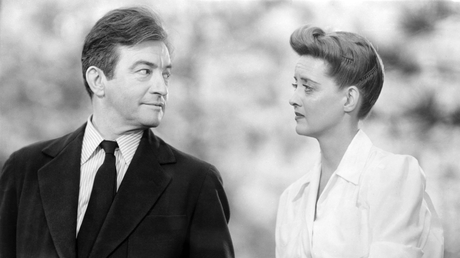
Just as the book begins with some big differences with Dr. Jaquith, we also get some more differences with him near the end of the book. One scene I wish had been included in the movie is a scene where Charlotte sees Dr. Jaquith before her second trip to Cascade, where she laments not having any direction in her life and that the end of her engagement to Elliot means she will never have a home or family of her own. Dr. Jaquith has a very modern perspective and tells her that having a home of her own doesn’t necessarily require a husband and that there are other ways to fulfill her maternal desire without biological children. So when Charlotte meets Tina and wants to work with her, Dr. Jaquith is more receptive to the idea than he is in the movie because he sees that it could be good for her and for Tina, but still has reservations given Charlotte’s relationship with Jerry. (He also plans to start a program for children at Cascade, which he hopes Charlotte will donate to. There’s a brief reference to a new wing at Cascade in the movie that Charlotte is involved with, but it’s never stated that it’s for children.) This scene also gives some extra weight to the ending where we see Charlotte back at the home where her mother lived. While her mother was alive, the home was described as being dark and imposing. But Charlotte has listened to Dr. Jaquith and made it her own — vibrant and full of life, with Lisa’s daughter June often staying with her in addition to Tina. The bustling activity we see at the home at the end of the movie is the norm, not Charlotte simply putting on a show for Dr. Jaquith and Jerry when they visit. The scene with Dr. Jaquith’s advice drives home the idea that Charlotte is now truly leading a rich, fulfilling, well-rounded life, husband or no husband.
Is the Book Worth Reading?
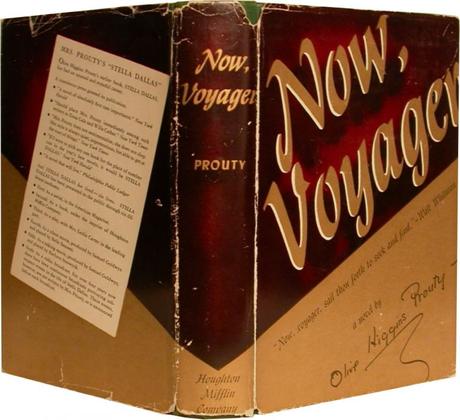
Now, Voyager is the kind of book I didn’t want to finish reading. The movie has long been one of my all-time favorites and I loved the book every bit as much. I’d been wanting to read the novel version of Now, Voyager for a long time and I couldn’t be happier that I finally did so. It’s been a real pleasure to spend so much time with such a thoughtful, beautifully told story. Even though I already knew the basic story from the movie, I loved getting all the additional insights and details the book provides.
The novel Now, Voyager was first published in 1941 as part of Olive Higgins Prouty’s series of books about the Vale family of Boston. Reading Now, Voyager has gotten me interested in finding copies of the other books in the series, particularly 1938’s Lisa Vale. I already liked the character of Lisa since she seemed to be such an ally to Charlotte in the movie, but the extra detail we get about her in the book made me want to explore that character some more.
When I read books that were adapted into films, I often have an easy time seeing why certain people are cast in certain roles. When I read Wife vs. Secretary last summer, I could absolutely picture someone at MGM reading it and insisting that they get the film rights because it would be a perfect vehicle for Myrna Loy. With Now, Voyager, I felt like the part of Dora Pickford, Mrs. Vale’s nurse, was practically written with Mary Wickes in mind. As iconic as both Bette Davis and Gladys Cooper are as Charlotte and her mother, Mary Wickes is always a delight and it’s really easy to read her part in the book and think, “This is pure Mary Wickes gold.”
This review is part of the 2022 Classic Film Summer Reading Challenge hosted by Out of the Past. For more reviews on books related to classic film, be sure to follow the #ClassicFilmReading hashtag on social media.
